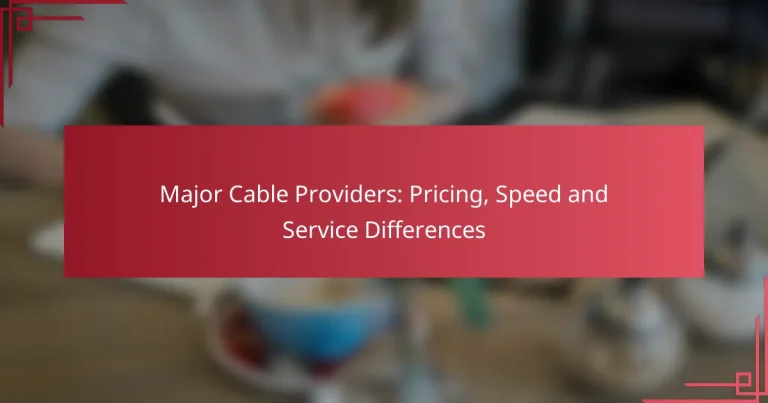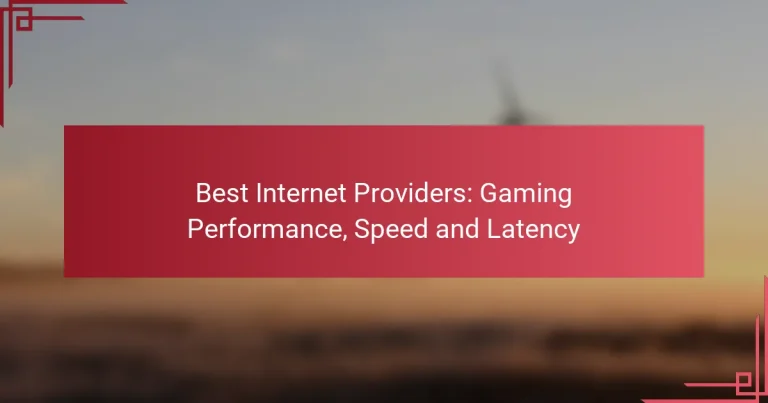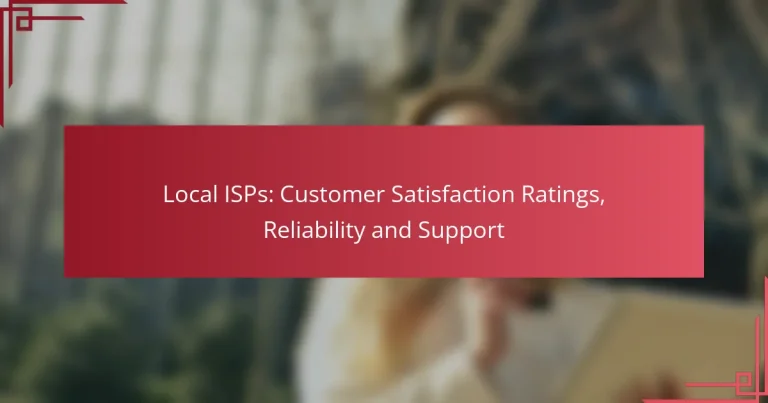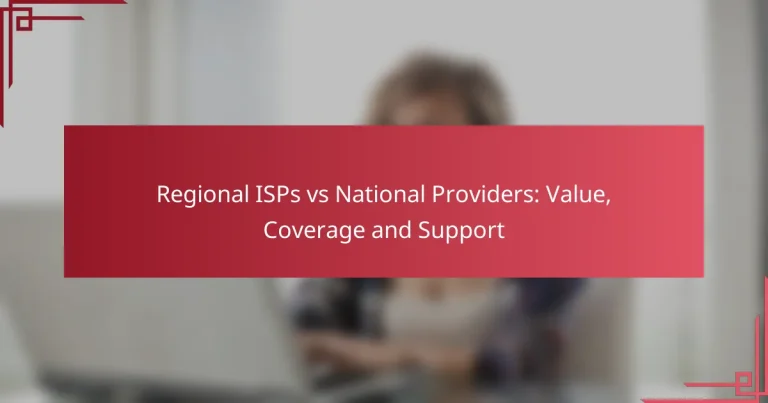Top ISPs: Small Business Needs, Pricing, Speed and Reliability
For small businesses in the US, choosing the right Internet Service Provider (ISP) is crucial for ensuring high-speed connectivity and reliable support. Major providers like Comcast, AT&T, and Verizon offer a variety of plans tailored to meet the unique needs of small enterprises, with pricing typically ranging from $50 to $200 per month. It’s important for businesses to evaluate their operational requirements, as ISP speeds can vary widely, generally falling between 25 Mbps and 1 Gbps.
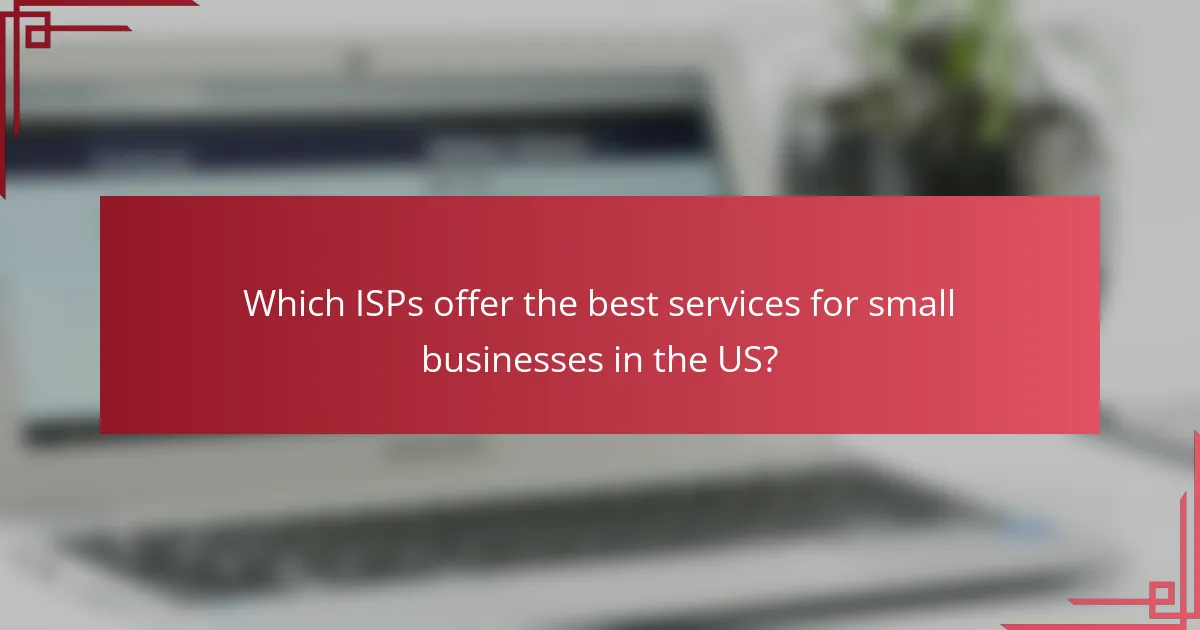
Which ISPs offer the best services for small businesses in the US?
Several ISPs cater specifically to small businesses in the US, providing a range of services that include high-speed internet, reliable connectivity, and tailored support. Key players like Comcast, AT&T, Verizon, CenturyLink, and Charter Spectrum stand out for their competitive pricing and service offerings.
Comcast Business
Comcast Business is known for its robust internet solutions, offering speeds that can reach up to 1 Gbps. Their plans are designed to accommodate various business needs, from basic connectivity to advanced features like static IP addresses and enhanced security options.
Pricing typically starts around $70 per month, depending on the speed and features selected. Businesses should consider their specific requirements, such as bandwidth needs and customer support, when choosing a plan.
AT&T Business
AT&T Business provides a range of internet services, including fiber options that can deliver speeds up to 5 Gbps in select areas. Their plans often include additional features like cybersecurity tools and cloud storage solutions, making them suitable for tech-savvy businesses.
Monthly costs generally range from $60 to $300, influenced by the speed and service level. It’s advisable for businesses to evaluate their current and future internet needs to select the most appropriate plan.
Verizon Fios
Verizon Fios is recognized for its fiber-optic internet, which offers high-speed connections with low latency. Typical speeds range from 200 Mbps to 940 Mbps, making it ideal for businesses that rely on fast and reliable internet for operations.
Plans start around $80 per month, and businesses should consider the availability of Fios in their area, as it may not be accessible everywhere. Additionally, Verizon offers bundled services that can provide cost savings for businesses needing phone and TV services.
CenturyLink
CenturyLink offers a variety of internet plans, including DSL and fiber options, with speeds that can reach up to 940 Mbps. Their pricing is competitive, often starting around $50 per month, making it an attractive choice for small businesses looking for value.
When selecting CenturyLink, businesses should assess the type of connection available in their area, as DSL may not provide the same speeds as fiber. CenturyLink also offers flexible contract terms, which can be beneficial for businesses wary of long-term commitments.
Charter Spectrum
Charter Spectrum provides cable internet services with speeds ranging from 200 Mbps to 1 Gbps. Their plans are straightforward, with no data caps, which is advantageous for businesses with high data usage.
Pricing starts around $50 per month, and businesses can benefit from bundled services that include phone and TV options. It’s important to check the service availability in your area, as this can affect the overall value and performance of the service.
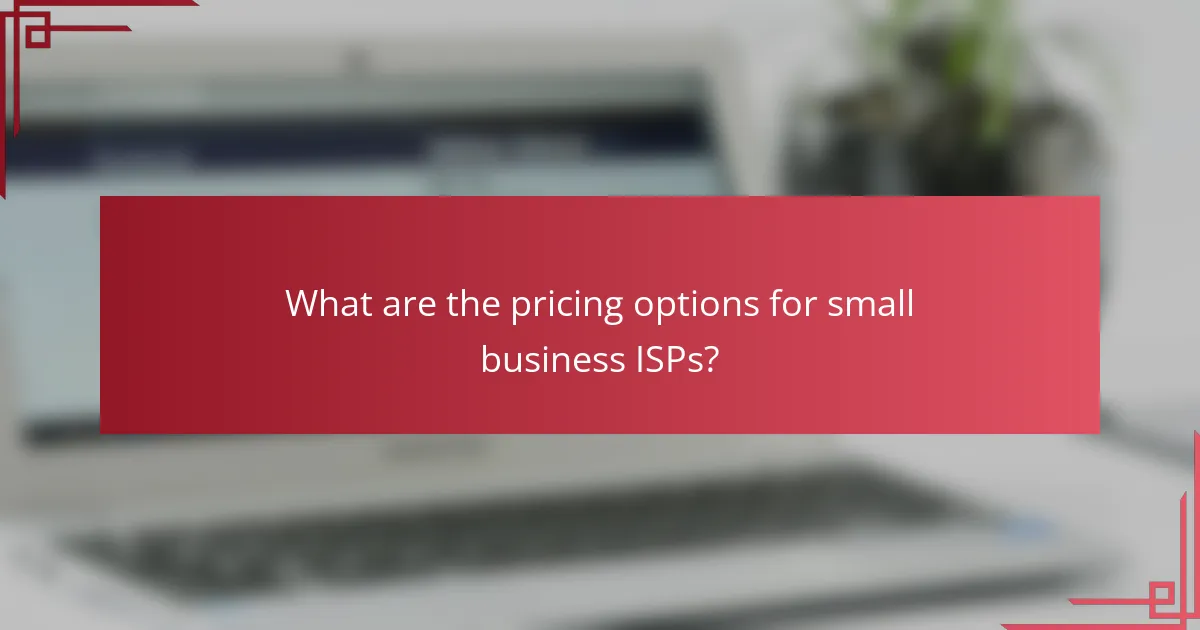
What are the pricing options for small business ISPs?
Small business ISPs typically offer a range of pricing options based on speed, data limits, and service features. Costs can vary significantly, often starting from around $50 to $200 per month, depending on the provider and the specific plan chosen.
Comcast Business pricing tiers
Comcast Business provides several pricing tiers designed for small businesses, starting with basic plans that offer speeds around 25 Mbps. These plans can range from approximately $70 to $100 per month, depending on the speed and features included.
Higher-tier plans can offer speeds up to 1 Gbps, with prices reaching $300 or more monthly. Businesses should consider their bandwidth needs and the number of users to select the most cost-effective plan.
AT&T Business pricing plans
AT&T Business offers flexible pricing plans that cater to various small business needs, starting at about $60 per month for basic internet services. These plans typically provide speeds of up to 50 Mbps.
For businesses requiring higher speeds, AT&T offers plans that can exceed 1 Gbps, with prices ranging from $100 to $500 monthly. It’s advisable to evaluate the specific requirements of your business to choose the right plan.
Verizon Fios pricing structure
Verizon Fios features a straightforward pricing structure, with plans beginning around $70 per month for speeds of 200 Mbps. This option is suitable for small businesses with moderate internet usage.
For higher performance, Verizon offers plans that can reach up to 940 Mbps, with monthly costs ranging from $90 to $150. Businesses should assess their internet usage patterns to determine the best plan that balances speed and cost.
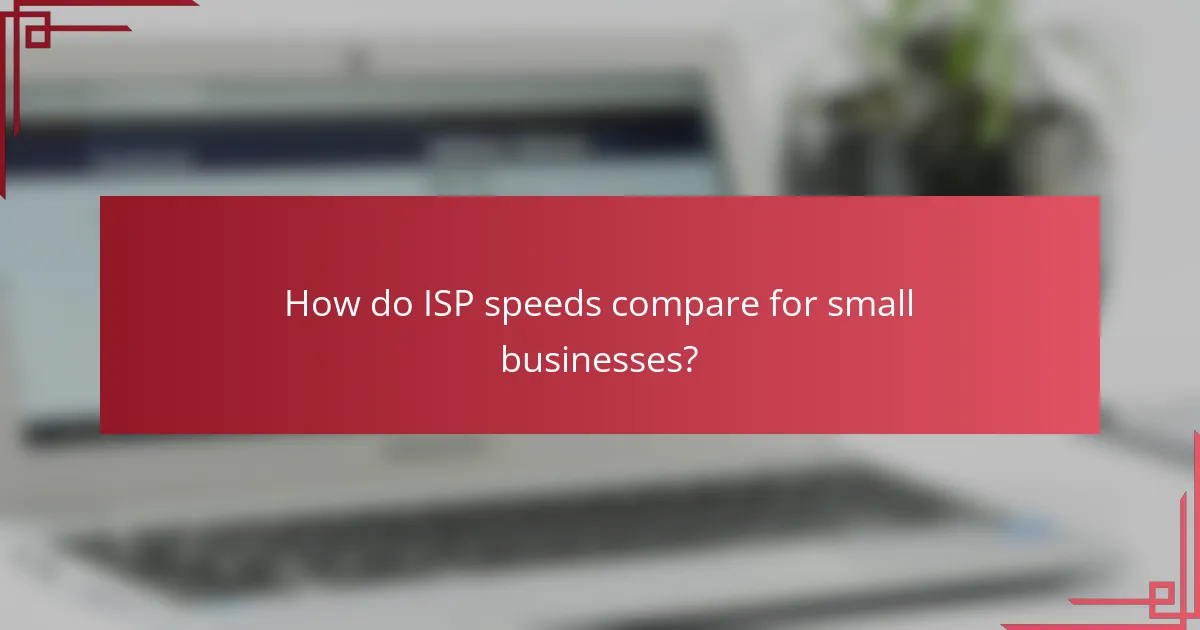
How do ISP speeds compare for small businesses?
ISP speeds for small businesses vary significantly based on the provider and plan selected. Generally, businesses should look for speeds that support their specific operational needs, typically ranging from 25 Mbps to 1 Gbps, depending on the number of users and types of applications used.
Comcast Business speed offerings
Comcast Business provides a range of speed options tailored for small businesses, starting from 25 Mbps and going up to 1 Gbps. Their plans often include features like static IP addresses and enhanced security, which can be crucial for business operations.
When choosing a plan, consider the number of devices and users that will be connected. For instance, a plan with 100 Mbps may suffice for a small team, while larger operations may require higher speeds to avoid slowdowns during peak usage times.
AT&T Business speed options
AT&T Business offers various speed tiers, with options starting at 25 Mbps and reaching up to 1 Gbps or more in select areas. Their fiber plans typically deliver higher reliability and lower latency, which is beneficial for businesses that rely on cloud services or video conferencing.
It’s advisable to assess your business’s internet usage patterns. If your operations include heavy data transfers or multiple simultaneous users, opting for higher speeds can enhance productivity and reduce frustration.
Verizon Fios speed capabilities
Verizon Fios provides competitive speed offerings, ranging from 200 Mbps to 940 Mbps for small businesses. Their fiber-optic network ensures consistent performance, making it a strong choice for businesses that require fast and reliable internet access.
Before selecting a plan, evaluate your specific needs, such as the number of employees and the types of applications used. For example, a business heavily reliant on streaming or large file uploads may benefit from the higher-end plans to ensure smooth operations.
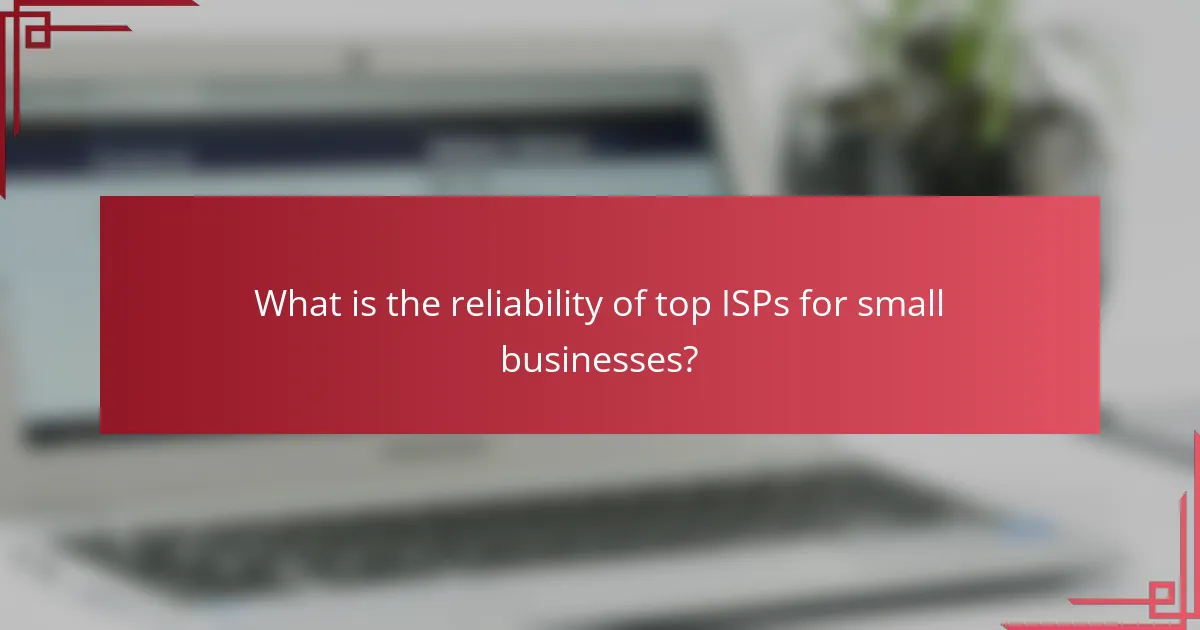
What is the reliability of top ISPs for small businesses?
The reliability of top ISPs for small businesses is crucial for maintaining operations and ensuring customer satisfaction. Factors such as uptime, service quality, and customer support play significant roles in determining how dependable an ISP is for business needs.
Comcast Business reliability ratings
Comcast Business generally receives favorable reliability ratings, often achieving uptime percentages in the high 90s. Their service includes a Service Level Agreement (SLA) that guarantees a certain level of performance, which can be particularly beneficial for small businesses that rely on consistent internet access.
However, some customers report occasional service interruptions, especially during peak usage times. It’s advisable for businesses to assess local reviews and performance metrics to gauge reliability in their specific area.
AT&T Business uptime statistics
AT&T Business typically boasts strong uptime statistics, often around 99% or higher, making it a solid choice for small businesses. Their fiber-optic services provide high-speed connections that contribute to this reliability, ensuring minimal downtime.
Small businesses should consider the specific plans available, as some may offer better reliability features than others. It’s also wise to inquire about compensation policies for outages, which can help mitigate losses during service disruptions.
Verizon Fios customer satisfaction
Verizon Fios consistently ranks high in customer satisfaction surveys, particularly regarding reliability and speed. Many small businesses appreciate the fiber-optic technology that supports stable connections and fast data transfer rates.
While Verizon Fios is generally reliable, small businesses should evaluate the availability of service in their area and consider customer feedback on installation and support experiences. This can provide insights into potential reliability issues and overall service quality.
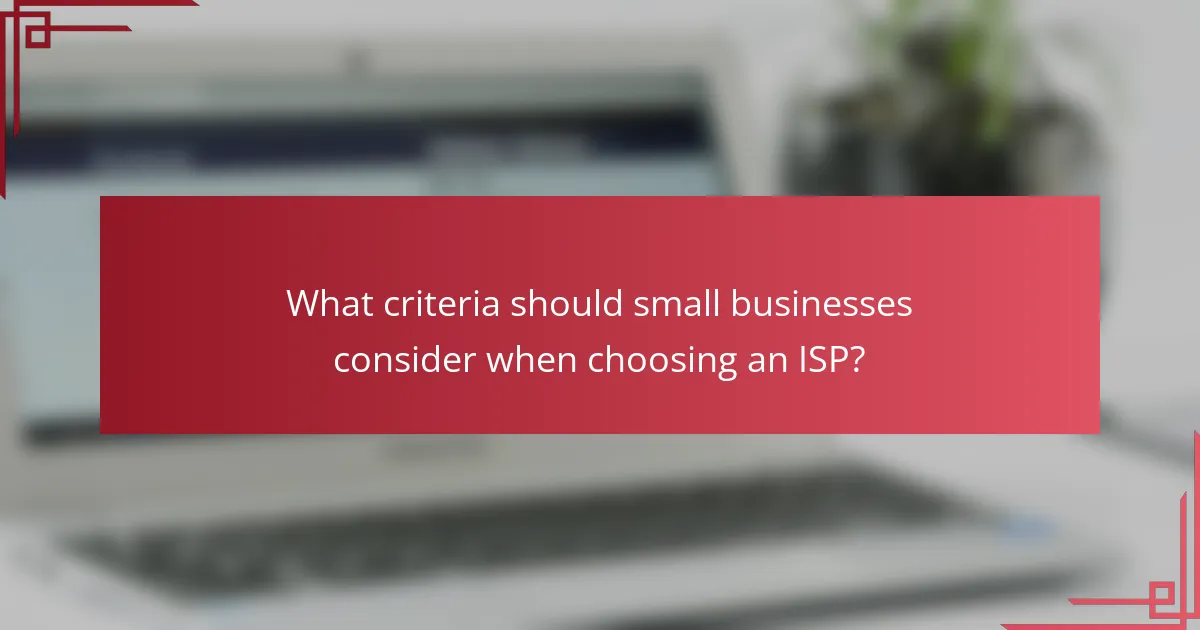
What criteria should small businesses consider when choosing an ISP?
Small businesses should focus on speed, pricing, and customer support when selecting an Internet Service Provider (ISP). These factors directly impact operational efficiency and overall satisfaction with the service.
Speed requirements
Speed is crucial for small businesses, as it affects productivity and user experience. Consider the number of users and the types of activities, such as video conferencing or large file uploads, which may require higher bandwidth. A range of 25 to 100 Mbps is often suitable for small teams, but specific needs may vary.
To determine the right speed, assess current usage patterns and anticipate future growth. Tools like speed tests can help gauge existing performance and identify gaps. Remember that higher speeds often come with increased costs, so balance needs with budget constraints.
Pricing flexibility
Pricing flexibility is essential for small businesses, as it allows for adjustments based on changing needs. Look for ISPs that offer various plans, including pay-as-you-go options or bundled services that can lower overall costs. Monthly fees can range from $50 to $200 depending on speed and features.
Be wary of long-term contracts that may lock you into a plan that doesn’t fit your evolving requirements. Seek providers that offer trial periods or easy cancellation policies, enabling you to switch if necessary without incurring significant penalties.
Customer support quality
Reliable customer support is vital for small businesses that depend on consistent internet access. Evaluate the availability of support channels, such as phone, chat, or email, and consider the average response times. Quality support can significantly reduce downtime and frustration during technical issues.
Research customer reviews and ratings to gauge the reputation of potential ISPs. Look for providers that offer 24/7 support and have a clear escalation process for unresolved issues. This ensures that help is readily available when you need it most.


